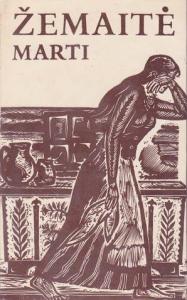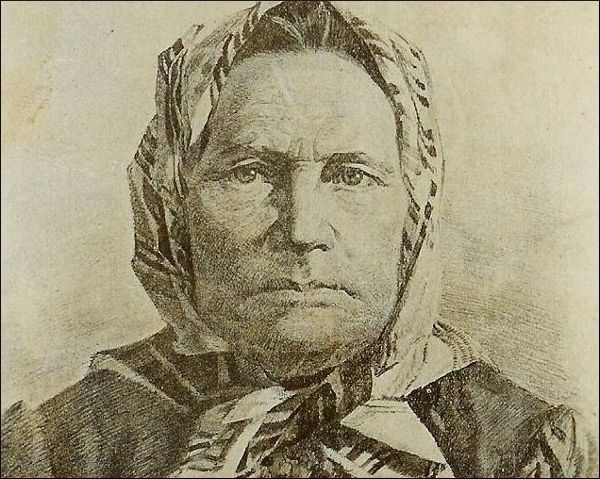
- Marti
- Published by: Šviesa (1985)
- Level: Beginner
- First Published in: 1898
In this classic of Lithuanian literature, a young girl named Katrė is forced to wed a man she doesn't love and suffer the coarseness and indifference of his family.
Žemaitė‘s Marti (which means “daughter-in-law” in Lithuanian) is definitely one of the most prominent pieces of Lithuanian literature and is nowadays part of the school curriculum nationwide. This novel, written between 1896 and 1898, is an exemplary case of what is generally called Lithuanian Realism. It is an ode to values like hard work, dedication, and sacrifice, which are all juxtaposed with an extremely sad narrative that portrays the unfortunate life of a somewhat typical woman in 19th century Lithuania.
The protagonist, Katrė, is the only real protagonist in the story. Her parents are above all concerned about the potential wealth their daughter could inherit through marriage, and so Katrė is forced to wed Vingių Jonas (from the Vingiai family), who is an emotionless slob who does not care for his wife at all. In fact, the whole Vingiai family is extremely mean to Katrė, who, even in highly miserable conditions, does her best to complete her chores, serve her husband, and take care of her new in-laws. “Tylėk, na! Tuoj gauni į snukį! Kaip sakau, taip ir bus” (Shut up already. Or else I’ll punch you! I’ll do as I say), shouts Jonas, who not only is indifferent to his wife but also shows aggressive tendencies, using rough colloquial language.
"Žemaitė is considered to be the mother of Lithuanian Realism, with her stories about the unfortunate lives of common people."
Throughout the whole novel, there is a clear juxtaposition between Katrė and the Vingiai family, as the latter are incredibly lazy, live in a mess, and are only concerned with material wealth. Jonas is described multiple times in great detail as an extremely untidy person, whose last concern is his personal hygiene: “… marškiniai buvo juodai sudėvėti, šunies neperkandami” (... his shirt was so worn-out it has turned black, not even dog’s teeth could bite it). Most importantly, the Vingiai family shows Katrė neither respect nor any kind of affection, and Jonas’ mother calls her “purvabridė,” a compound noun literally meaning: “the one who walks through mud.”

Žemaitė, throughout her novel, uses words which are still understandable to present-day Lithuanians – like the already mentioned "purvabridė" – yet are difficult to imagine being used today in spoken or written communication. Also, another layer of language in Žemaitė‘s prose is that the Vingiai family – as well as, to an extent, Katrė’s parents – speak in a way that indicates their lack of educational background and their heartlessness towards Katrė. While talking to her new in-law, Jonas’ mother shouts: “…aš nemeilysiu kąsnio iš marčios rankų, to nenoriu, neprašau!” (I’m not going to beg for a bite of food from the hands of my daughter-in-law, I don’t want this, I’m not asking for this!). However, the way Jonas’ parents treat him (that is, spoil him) proves that these characters are capable of talking sweetly. They simply refuse to be nice to Katrė.
"Throughout the novel, there are words that are still understandable to present-day Lithuanians yet are difficult to imagine being used today in spoken or written communication."
Žemaitė (whose real name was Julija Beniuševičiūtė-Žymantienė), in Marti, does a great job of depicting the gloomy patriarchal reality that many women in the region were forced to be a part of more than a century ago. Hard-working, submissive, obedient, voice-less: this is what life for many women was like back in the day, and Katrė’s situation, although apparently too dark, does seem like a historically plausible story. This is why Žemaitė is considered to be the mother of Lithuanian Realism, with her stories about the unfortunate lives of common people.

